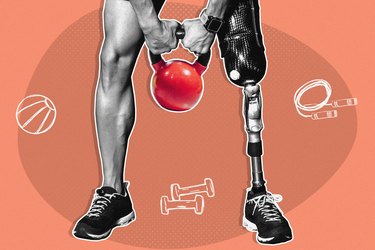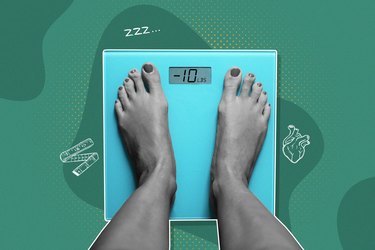
If weight loss is your goal, you might be excited to see the numbers on your scale drop. But there is such a thing as losing weight too fast — and it can lead to unpleasant side effects.
Before we get into those, though, how fast is too fast when it comes to weight loss?
Video of the Day
Video of the Day
"According to the National Institutes of Health and weight-loss experts, losing 1 to 2 pounds per week is the healthiest and most sustainable pace of weight loss," says Gary Foster, PhD, chief scientific officer at WeightWatchers. "After the first few weeks, weight loss that regularly exceeds [that pace] is considered too rapid."
What's more, "when we discuss a fast rate of weight loss, we're referring to weight loss after the first one to two weeks of the journey," Foster says. "In the beginning of a weight-loss journey, a higher rate of weight loss can be expected due to the loss of water weight and your body's reaction to a new routine."
So, what happens if you lose weight too fast? Here are the common complications:
Tip
Talk to your doctor before embarking on any weight-loss endeavor to make sure it's safe for you (and to avoid the side effects of losing weight too fast), per the Mayo Clinic.
1. You Might Feel Dizzy and Tired
First on the list of what happens when you lose weight too fast: Feeling faint.
"If you experience rapid weight loss as a result of a nutritionally inadequate diet, research has shown some physical symptoms may include lightheadedness when standing up," Foster says.
Indeed, not getting enough nutrients — like fat, protein, carbs, vitamins and minerals — can make it difficult for your body to function, leading to fatigue and dizziness, per the Cleveland Clinic.
That's why doctors recommend you don't cut more than 500 calories from your diet per day and focus on eating a variety of nutritious whole foods.
Tip
Calorie intake should not fall below 1,200 per day for people assigned female at birth or 1,500 per day for people assigned male at birth, except under the supervision of a doctor, per Harvard Health Publishing. That's because eating too few calories can deprive you of essential nutrients.
2. You May Feel Sick to Your Stomach
Feeling sick during weight loss? As it turns out, nausea and weight loss can go hand in hand.
If you have nausea while losing weight, that can happen for a number of reasons. For one, dizziness from rapid weight loss can lead to nausea, according to the Mayo Clinic. The nutritional deficiencies associated with an extremely limited diet can also cause stomach discomfort and other digestive issues like constipation, per the Cleveland Clinic.
Other times, nausea is a symptom of another side effect of rapid weight loss: gallstones (more on that in a moment).
Does Throwing Up Make You Lose Weight?
While vomiting can lead to temporary weight loss from lack of fluids, per the Mayo Clinic, you do not actually lose weight when you throw up.
In fact, throwing up to lose weight is extremely dangerous, according to the National Health Service. Making yourself throw up does not help you lose weight in the long term and can instead lead to issues with your bones, teeth and organs.
3. You Could Get Gallstones
On that note, if you're losing weight too fast, another side effect could be gallstones. Gallstones are small, hard deposits of cholesterol or bilirubin that form in your gallbladder, per the National Institute of Diabetes and Digestive and Kidney Diseases (NIDDK).
When you lose weight too fast, your liver can secrete extra cholesterol, and your gallbladder might not empty itself property. All together, that could put you at higher risk for gallstones.
These deposits can cause symptoms like:
- Pain in your abdomen
- Nausea
- Vomiting
- Fever
- Chills
- Jaundice
- Tea-colored urine and light-colored stool
Tip
Visit your doctor if you show symptoms of gallstones, as they can sometimes require surgery to remove, per the NIDDK.
4. You Could Lose Some Hair
Another danger of losing weight too fast is that your hair might fall out, according to the Cleveland Clinic.
That's because when you cut significant calories or eliminate entire food groups from your diet, you miss out on essential nutrients that help your body function at its best. The result: Side effects like hair loss.
5. You Could Lose Muscle
Your muscles are an important source of strength and are responsible for significant calorie burn, according to the Mayo Clinic.
When you lose weight at the expert-recommended pace of 1 to 2 pounds per week, this helps ensure you shed fat instead of muscle, per the Cleveland Clinic. But losing weight too fast typically means you're losing muscle (and its calorie-burning effects).
Avoid this side effect of rapid weight loss by shedding pounds gradually and maintaining an exercise routine throughout.
6. Your Metabolism Slows
Similarly, when you shed pounds too fast, your metabolism shifts into survival mode to preserve energy and prevent starvation, according to the Cleveland Clinic.
This means you burn calories at a slower rate. If you start eating your regular diet again, this can be a shock to your system — because your metabolism is no longer used to processing that amount of calories, it's easy to regain any weight you lost.
7. Your Bone Density Might Decrease
Another symptom of losing weight too fast is that your bones may weaken, per the Cleveland Clinic.
When you don't get adequate nutrients, your body's systems aren't able to function well — and that includes your skeleton. Indeed, rapid weight loss has been linked to low bone mineral density and poor bone health, according to October 2015 research in Current Opinion in Endocrinology, Diabetes and Obesity.
Again, the best way to preserve your bone health is to lose weight at a slower, steadier pace.
8. You Might Have Trouble Focusing
Rapid weight loss side effects aren't just physical. So if you lose weight too fast, what happens to your brain?
"Studies have shown additional symptoms of rapid weight loss can include decreased concentration and fatigue," Foster says.
That's right: One of the side effects of losing weight too fast is that you don't have enough nutrients to sustain your energy levels, which gets in the way of your ability to think clearly.
9. You May Quit Your Diet
Losing weight too quickly can be a sign you're cutting out too many nutrients or following an extreme diet program. And neither of those things are sustainable in the long term, according to the Cleveland Clinic.
When you restrict your calorie intake so drastically, you experience hormonal changes that give you an appetite — its your body's way of preventing starvation. As a result, its difficult — and not advisable — to stick to a limiting diet.
"The more dramatic or extreme the change of behavior, the less likely it will be sustainable," Foster says. "Your weight-loss journey should not feel punitive; it should be something you're doing for yourself, not against yourself."
What to Do Instead
Instead of hopping on a diet that promises rapid weight loss, aim to cut about 500 calories from your daily diet, which will help you lose about a pound per week. You can also cut fewer calories — say, around 250 — and burn the remainder through weight loss-friendly exercise.
Remember: The ultimate goal of losing weight is to help you get healthier. Take a slow-and-steady approach to reach that goal and avoid any potentially dangerous side effects.
- Mayo Clinic: “Weight loss: Choosing a diet that's right for you"
- Cleveland Clinic: "Is It Bad to Lose Weight Too Quickly?"
- Harvard Health Publishing: "Calorie counting made easy"
- National Health Service: "Bulimia"
- Mayo Clinic: "Metabolism and weight loss: How you burn calories"
- Current Opinion in Endocrinology, Diabetes and Obesity: "Weight Loss and Bone Mineral Density"
- National Institute of Diabetes and Digestive and Kidney Diseases: "Gallstones"
- Mayo Clinic: "Dehydration"
- Mayo Clinic: "Nausea and vomiting"






